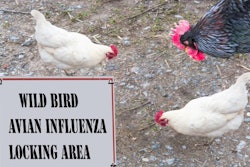
The United States Department of Agriculture’s (USDA) Animal and Plant Health Inspection Service (APHIS) on May 18 confirmed the presence of virulent Newcastle disease in a small flock of backyard exhibition chickens in Los Angeles County, California.
This is the first case of virulent Newcastle disease, previously referred to as exotic Newcastle disease, in the U.S. since 2003.
APHIS is working closely with the California Department of Food and Agriculture to respond to the finding. Federal and state partners are also conducting additional surveillance and testing in the area.
It is essential that all bird owners follow good biosecurity practices to help protect their birds from infectious diseases, the agency emphasized. These include simple steps like washing hands and scrubbing boots before and after entering a poultry area; cleaning and disinfecting tires and equipment before moving them off the property; and isolating any birds returning from shows for 30 days before placing them with the rest of the flock.
In addition to practicing good biosecurity, all bird owners should report sick birds or unusual bird deaths to State/Federal officials, either through their state veterinarian or through USDA’s toll-free number at +1.866.536.7593. Additional information on biosecurity for backyard flocks can be found at Biosecurity for Birds website.
Not a food safety concern
APHIS stressed that the presence of the disease is not a food safety issue. No human cases of Newcastle disease have ever occurred from eating poultry products. Properly cooked poultry products are safe to eat. In very rare instances people working directly with sick birds can become infected. Symptoms are usually very mild, and limited to conjunctivitis and/or influenza-like symptoms. Infection is easily prevented by using standard personal protective equipment.

















